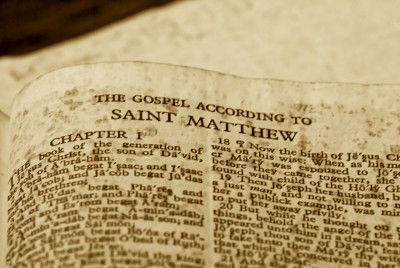“Who do you say that I am?” Jesus to his disciples in Matthew 16:15
“No one can encounter Matthew’s Jesus without concurring that before us in the evangelist’s mind is God Incarnate.” (Rabbi Jacob Neusner, A Rabbi Talks with Jesus) “A man who was merely a man and said the sort of things Jesus said would not be a great moral teacher. He would either be a lunatic -- on the level with the man who says he is a poached egg -- or else he would be the Devil of Hell. You must make your choice. Either this man was, and is, the Son of God…But let us not come with any patronizing nonsense about His being a great human teacher. He has not left that open to us.” (C.S. Lewis, Mere Christianity)
These
verses are the teaching climax of Matthew’s gospel. Here Jesus reveals himself as the both Messiah and the
divine Son of God. He
doesn’t just put an announcement in the church bulletin or update his status on
facebook: “I am the Messiah.” Rather, the setting has been carefully chosen and
the Master Teacher has been about his craft.
In
the shadow of the pagan temples of Caesarea Philippi, Jesus asks two questions. The first is a lead-in; the
second is the most important question that any human living at any time must
answer. The first question is a
general question to his disciples: “Who do people say the Son of Man is?” (v.
13). Then he said to them
the second question. This
time it was personal. “Who do you say that I am?” (v. 15, emphasis added).
When
man stands before God and gives an account of his life, man will not be asked
the question, “How much money did you make?” Neither will he answer other questions such as, “What was
your job title?” “How big was your house?” “What kind of car did you drive?” “Did you faithfully attend church?”
“Did your good deeds outweigh your bad deeds?” Not even, “Did you ever go on a missions trip,” or “Did you
lead someone to Christ?” The
question asked by Christ in the Day of Judgment that all humans must answer is,
“Who do you say that I am?”
The
Christian faith is a personal faith. We are not seen in God’s eyes based on our ethnicity,
nationality or even our family heritage. Each person is responsible to respond individually to
the revelation of Jesus Christ.
Jesus tells us at the end of the Sermon on the Mount that on the Day of
Judgment that many will say, “Lord, Lord, did we not do all these great things
in your name?” To which Jesus will
say, “I never knew you; depart from me.”
(7:23).
When
Jesus posed the superlative question to his disciples, Simon Peter was the one
who answered. Peter was the
spokesperson for the Twelve and is always mentioned first whenever a list is
given in the New Testament of the Twelve Disciples: 10:2-4, Mark 3:16-19, Luke 6:14-16 and Acts 1:13, 26. Simon Peter replied, “You are
the Christ, the Son of the Living God,” (v. 17). Peter’s answer is perfect and worthy
of unpacking.
First
Peter calls Jesus “the Christ,” which is
the Greek translation of the Hebrew word for “Messiah.” Peter also uses the adjective “living.” Our
God is a living God, unlike the idols
of Pan and Baal that were worshiped there in Caesarea Philippi. Our God was not made with human
hands; rather he spoke the universe into existence. Peter’s words also point to Christ’s resurrection. Rising from the dead is something no
other prophet or god has ever done.
Jesus referred to himself
as “…the living one. I died, and
behold I am alive forevermore,” (Revelation 1:18).
Peter
also referred to Christ as “the Son of…God.” That title is used frequently of Jesus,
even in the proclamation of his birth (see Luke 1:35). The title means that Jesus is a
partaker in the Divine Nature of the Godhead, the Second Person of the
Trinity. One should not assume
that the prefix, “son of…” implies “less than.” Rather, in Scripture it references “of the same essence.”
For example, James and John are called “the sons of thunder,” in Mark
3:17. (See also “sons of
disobedience” in Ephesians 2:2 and 5:6 as well as “sons of light” in 1
Thessalonians 5:5. )
Here
in Peter’s great confession: Jesus is the Promised Messiah, the living God and
he is divine. At Jesus’
trial this same glorious confession comes up again. It is prompted by the high priest: “I adjure you by the living God, tell us if you are the Christ, the Son of God. Jesus said
to him, “You have said so.”
(26:63-64, emphasis added).
Who
is Jesus to you? Merely a good
man, a prophet, a wise teacher? Or
is he the Christ, the Son of the Living God? There is no greater question that confronts man than this
one; all eternity hinges on our heart behind our answer.
